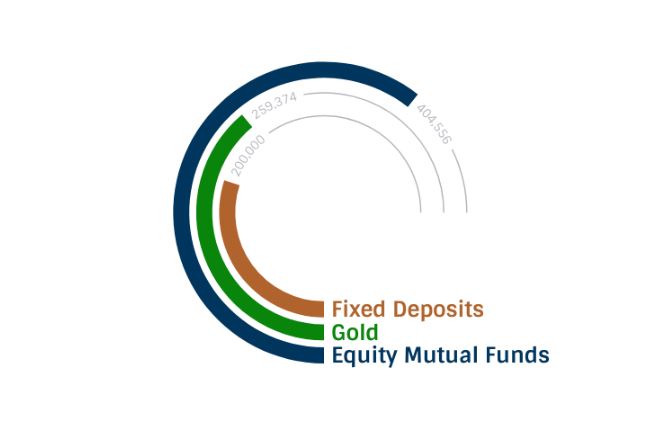Bonus Bonanza – This Investment Can Get You Higher Returns on Your Bonus

Last Updated : May 4, 2019, 6:33 p.m.
Yearly appraisal comes in all shapes and sizes. Some get the incremental benefits, some get hefty bonuses and some get both. In our previous post we talked about how can you create wealth with your salary hike. In this post we are going to show you how to take care of your bonus.
Normally when we come across such large amount of money then our first reaction is to go on a shopping spree or going on an expensive vacation that we always thought about. Spending for instant gratification is fine but things take a sour turn when at the end of all those celebration we ponder what could have been the case had we put that money to some better use!!! Through this post we will highlight the areas where you can choose to put your hard earned money to good use and create wealth in the process. Sounds like a win-win situation, right? Just keep reading till the end and you will not be disappointed.
You can choose from any of these investments – fixed deposit, gold, real estate and mutual fund – to achieve your goal. But which is the best of the lot? Let’s compare and see what kind of returns are given by different investment tools.
Return Comparison of Different Investment Options
| Investment Options | Estimated Average Return If Invested for Less Than 3 Years | Estimated Average Return If Invested for More Than 3 Years |
|---|---|---|
| Fixed Deposit | 7% | 7% |
| Gold | 4.68% ★ | 6%-10% ★ |
| Debt Mutual Fund | 8%-9% | - |
| Equity Mutual Fund | - | 12%-15% |
Note – The★ mark corresponding to gold denotes that returns on investments in this asset class fluctuate significantly.
How much returns can you get with ₹1 lakh for a tenure of 10 yrs?
Check out the table below to know how far the money can grow in 10 years with a one-time lump sum investment of 1 lakh.
| Investment options | Estimated Annual Rate of Return | Estimated Proceeds (In ₹) |
|---|---|---|
| Fixed Deposit | 7% | 2 Lacs |
| Gold | 6%-10% | 1.79-2.59 Lacs |
| Equity Mutual Fund | 12%-15% | 3.10 - 4.04 Lacs |
Note – The figures of proceeds are purely indicative.

NOTE – The above illustration factors the scenario of getting maximum returns on different investment tools
Fixed deposit is always a good option but…
Even though fixed deposits have a fair share of advantages such as return stability and less risky, they come with pitfalls that can make investments there less worthy.
Returns Not in Line with Inflation – The fixed deposits generate returns that are not in line with inflation. You can get an average return of around 6.50%-8.00% before tax. Post tax, the returns can come down to 5.50%. With such shoddy returns, you may find it hard to achieve your ambitious goals.
Less Tax Efficient – The fixed deposit returns also come under the purview of the taxman. If you earn interest of more than ₹10,000 in a financial year, the Tax Deducted at Source (TDS) at 10% would be levied on the same.
Premature Withdrawal Attracts Penalty – You could come across situations that would compel you to withdraw before the maturity. So, if you withdraw before your fixed deposit matures, you have to settle for a lesser proceed compared to when allowed to continue till the maturity. Premature withdrawal invites interest penalty of 1%-2%. So, if you deposit ₹1 lakh for 3 years, it would raise to ₹1,20,000 at maturity at 7% interest rate (assumed). If you withdraw after 2 years, the proceed would shorten to around ₹1,10,000.
Gold is considered an easy investment option but is it the right one?
Investing in gold is an old phenomenon as the said asset can be easily bought and sold. But there are certain disadvantages of investing in gold. Check out below the disadvantages.
Sale Value Won’t Include Making Charges – Many of us buy gold to make jewellery, which includes making charges as well as the tax. Going by the current rate, 10 gram of 22 Karat gold costs ₹31,100. To make jewellery, one has to pay making charges at 10%. Further, you need to pay the Goods and Services Tax (GST) at 3% over the entire sum. If you do the calculation, the total sum comes as ₹35,236.30. But when you sell the jewellery, you would get the real value of gold, not including the making charges and taxes.
Lack of Steady Income – You don’t stand to benefit from simply holding gold as it does not provide regular returns. Only when you sell the gold do you earn something out of it.
Banks Do Not Take Back Gold Coins & Bars Once Sold – Many buy gold coins and bars only to be at the losing end as banks do not accept these ornaments once they sell it to you.
Storage Charges Add to the Holding Cost of Gold – Gold is a precious metal that you want to be safe and secure. And so, you open a locker in banks to deposit gold ornaments to ensure their safety. But banks debit annual maintenance charges on the locker service. So, when you sell the gold ornaments to jewellers, they won’t factor in the maintenance charges that you must have paid to banks every year.
Debt Mutual Funds is a Good Option for Conservative Investors
Debt mutual funds are those funds that keep your money predominantly in fixed income instruments such as bonds, money-market instruments, etc. This is the investment for conservative investors who are looking to invest for a short term. Let’s have a look at it’s advantages –
Returns Better Than Competing Products – Debt mutual fund investments can help generate returns around 8%-9% in the short-term, faring better than its competing product i.e. fixed deposit wherein the anticipated returns would be around 7%.
Indexation Benefits – Indexation benefits are applicable to debt funds when you sell the units after 3 years of holding them. Capital gains arising from the sale would be taxed at 20% with the benefit of indexation, which is a tool that takes into account the inflation prevailing between the period when you bought the MF units and the period when you sell the same. This inflates the purchase price to reduce the capital gains so that the tax liability lowers down considerably than otherwise.
Equity Mutual Funds – When You are Investing for a Longer Term
The money invested in equity mutual funds is put into the high return proposition of equities. To achieve the investment fruition you need to stay invested for a long period, preferably for more than 3 years. Let’s check out the factors that encourage investments in equity MFs.
Higher Returns – The investments made in equity mutual funds have delivered an average of 15-18% returns for investors in a 10-year horizon. Such returns can help beat the inflationary pressures and allow you to fulfill your financial goals.
Check out below the returns from multi-cap, large cap, mid-cap and small-cap – the different categories of equity mutual funds – posted over different periods.
| Equity Fund Category | 3-year Return | 5-year Return | 10-year Return |
|---|---|---|---|
| Large-cap Fund | 13.78% | 12.73% | 13.97% |
| Multi-cap Fund | 12.87% | 14.79% | 16.57% |
| Mid-cap Fund | 11.26% | 17.54% | 20.61% |
| Small-cap Fund | 11.50% | 18.75% | 19.48% |
Note – Data sourced from Value Research, a mutual fund advisory firm
Large Cap Funds – These funds invest the money predominantly in stocks of top 100 companies according to the market capitalization.
Multi-cap Funds – These funds invest across the market capitalization to ensure greater diversification of the investor capital.
Mid-cap Funds – These funds invest the corpus predominantly in stocks of top 101 to 250 companies according to the market capitalization.
Small-cap Funds -These funds invest the money in stocks of companies that are ranked after the top 250 entities according to the market capitalization.
Tax Efficient – Lump sum investments made in equity mutual funds offer tax benefits to the investors. Capital gains up to ₹1 lakh arising out of the sale of equity MF units after 3 years would be free of tax. Capital gains above 1 lakh are taxed at 10%. Even if you sell within 1-3 years, gains above 1 lakh would be taxed at the same 10%. However, if you sell before a year, 15% tax would be charged.
Our View – Before making any investment plan, take account of factors like your age, risk appetite and goals which you need to accomplish. After you figure those out, it is a advisable to keep a balance of both debt and equity funds. This way you can insulate yourself to sudden market fluctuations and also create wealth.
Mutual Fund investments are subject to market risks, read all scheme related documents carefully.
Information contained in this article is not a complete representation of every material fact and is for informational purposes only. The recipient is advised to consult its advisor/ tax consultant prior to arriving at any investment decision.
